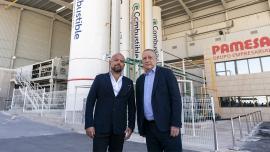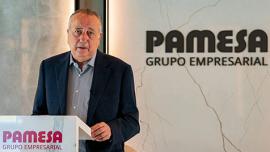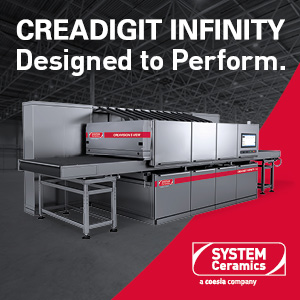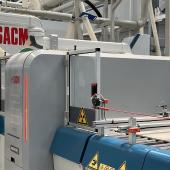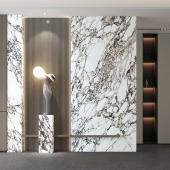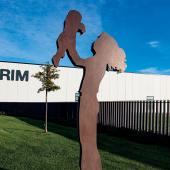Pamesa continues its unstoppable growth
Grupo Pamesa reported consolidated revenues of €1,220 million in 2021, a 56% increase on 2020. This included 43% growth in the ceramic segment to €881.7 million. Fernando Roig confirms that the group will be investing a further €95 million this year.
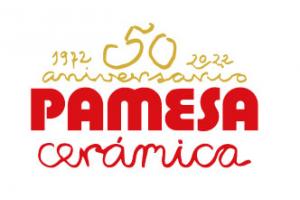
Grupo Pamesa, Europe’s largest ceramic tile producer with operations extending to raw material and spray-dried clay production and the commercialisation of energy, has reported record figures for 2021.
The Spanish group’s year-end results, announced by Chairman Fernando Roig at the annual press conference held on 16 June, surpassed all expectations.
Following the acquisition of Azuliber in September 2021, the group had predicted revenues of €1,100 million by the end of the year but this forecast was amply exceeded with consolidated revenues reaching €1,220.6 million, up 56% from €782.7 million in 2020, and pre-tax profits €97 million (+47%). In the ceramic segment alone, sales increased by 43% from €616 million to €881.7 million (72% of consolidated revenues), while total volumes rose from 92 million sqm to more than 125 million sqm.
The raw materials division also performed well (+47%), while the energy sector delivered the anticipated surge in revenues (+233%).
The hydrogen challenge
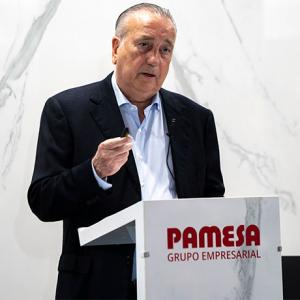
Commenting on the ceramic division’s performance, Fernando Roig explained that the soaring energy and raw materials costs in the second half of the year had placed a severe strain on the group’s ability to maintain its profitability.
The division’s gas bill climbed from €7.4 million in March 2021 to almost €33 million in November, an increase in terms of percentage of monthly revenue from 8% to 33%.
Moreover, the average price of gas quadrupled between May 2021 and the final quarter of the year (from 20 to 79 €/MWh) and then peaked in April 2022 (the average price in the first four months was 101 €/MWh) before falling again in May and June.
“Gas costs have increased this year following Russia’s invasion of Ukraine, so since last May we have been forced to apply an energy tax to all our sales, adjusted monthly according to European gas prices,” said Roig.
In the meantime, Grupo Pamesa has embraced the energy transition with a commitment to a hydrogen-powered future. In April, it invested in the US hydrogen-based fuel supplier eCombustible, while at the same time signing a ten-year contract for the supply of customisable hydrogen-based fuel with the aim of replacing the use of natural gas in its production processes and achieving zero CO2 emissions. The pilot plant in Onda is expected to be operational by the end of the year.
Self-sufficiency in clay
As Fernando Roig notes, the interruption in Ukrainian clay exports is not a major concern for the group as it has been working over the past four years to meet its raw material needs from Spanish quarries and reduce its dependency on foreign supplies.
Along with the Galve clay deposit in Teruel, owned by Grupo Pamesa since 2018, the acquisition of Azuliber included Mina Pilón, a white clay quarry also located in Teruel. This was followed at the beginning of 2022 by the approval of quarrying operations at Mina Elena, which will yield an estimated 60,000 tonnes of white clay per month. These deposits, together with the one in Valdecastillo (Teruel) which was acquired in 2020, will supply Pamesa with a minimum of 115,000 tonnes of white clay per month, ensuring sufficient stocks for the coming years.
In May, a DIA (Declaration of Environmental Impact) was issued for the Mina Mancilla red clay deposit in Alcora.
Further investments of €95 million
Following the 2021 investments focusing on the acquisition of Azuliber, the construction of the new headquarters in Vila-real and the renovation of the other companies’ offices and showrooms, Fernando Roig has confirmed that a further €95 million will be invested in 2022. In addition to the equity investment in eCombustible and the acquisition of Mina Elena, the group also plans to install new kilns, high-capacity presses, glazing lines, grinding plants and sorting lines and to adopt other measures for improving the flexibility of production facilities. The group plans to install new spray dryers in the Amizalsa, Atommed and Azuliber factories to boost its spray-drying operations, while its R&D investments include the above-mentioned customisable hydrogen-based fuel pilot plant as well as the development of new technologies for digital tile decoration and expansion of the product range with the launch of XTRA, a new type of thin material.
Social, economic and environmental responsibility
In keeping with its Corporate Social Responsibility strategy, Grupo Pamesa is maintaining its commitment to people and the environment. Its workforce has expanded steadily to 3,192 (1,039 more than in February 2020) and it adopts an incentive policy based on company performance. For example, in 2021 it distributed €7.8 million among all employees with at least six months’ service.
The investments made by Pamesa in recent years have enabled the group to attain a high level of environmental sustainability in its production processes. It has adopted systems for recovering heat from the kilns, 100% recycling of sludge and solid residues, as well as a photovoltaic roof (almost 113,000 square metres, the largest in Europe for self-consumption) that meets most of the electricity needs of the factories and avoids the emission of 11,768 tonnes of CO2 into the atmosphere each year. In addition, the first results of the gradual conversion to hydrogen-based fuel are expected to be seen next year.
Grupo Empresarial Pamesa
In the ceramic sector, Grupo Pamesa has 8 factories, 64 kilns (including its own and those of strategic partners), 11 logistics centres and 7 spray drying centres (Azuliber, Amizalsa, Atommed, Arcillas Atomizadas, Compacglass, Tau and Pamesa Porcelanico), all located in the Castellón ceramic district. The group owns the six brands Pamesa, Tau, Navarti, Prissmacer, Ecoceramic and Geotiles. It was founded in 1972 and is celebrating its 50th anniversary this year.
| Sales 2020 | Sales 2021 | % var. | |
|---|---|---|---|
| Ceramic tiles | 616.627.020 € | 881.714.558 € | +43% |
| Energy | 50.915.548 € | 169.767.425 € | +233% |
| Raw materials | 115.144.961 € | 169.073.530 € | +47% |
| Total | 782.687.529 € | 1.220.555.512 € | +56% |
Did you find this article useful?
Join the CWW community to receive the most important news from the global ceramic industry every two weeks







